Acne is a common, annoying, and often considered embarrassing skin condition that most people will experience at some point in their lives. What if something as simple and natural as cannabis could be the answer? Can CBD’s anti-inflammatory and antioxidant properties (and other benefits) help? Does THC affect acne? We looked at the available research.
Cannabis is known to be effective at easing symptoms of dermatological conditions and may even improve overall skin quality. Hemp seed oil has also garnered attention, although it’s not as well suited for serious acne cases.
THC’s effect on acne
There is very limited research on the effect of THC on acne, but this French study from 2014 found a correlation between cannabis use and moderate to severe acne, namely that the ‘consumption of sweets and chocolate and cannabis smoking were associated with acne’. However, it should be noted that consuming sweets and chocolate is often a result of cannabis use, so possibly the THC is a secondary rather than primary factor in cases of acne.
This study is cited in another, from 2017, titled The Risks and Benefits of Cannabis in the Dermatology Clinic. The link between anandamide, an endocannabinoid which is similar to THC – both are cannabinoid receptor agonists – and increased lipid production is demonstrated in an in vitro study. As high lipid production is a contributing factor in acne, this again points to THC as increasing the risk of acne rather than diminishing it. In contrast, CBD – a cannabinoid receptor antagonist – was found to counteract the increase in lipid production.
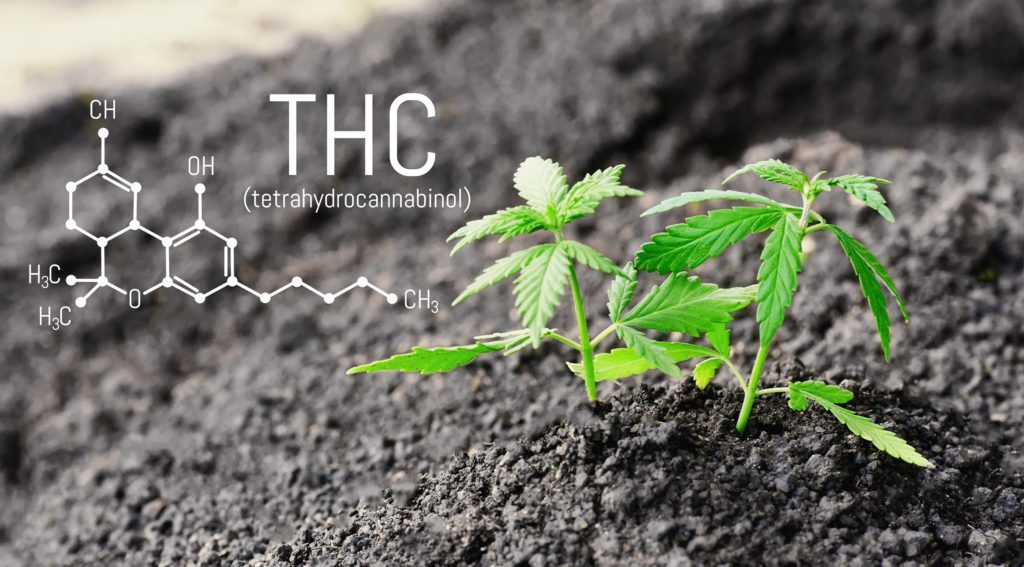
The section dealing with cannabis and acne also mentions a study showing that a cream containing 3% cannabis seed oil reduces sebum production. Rather worryingly, The Risks and Benefits of Cannabis in the Dermatology Clinic concludes that this result contradicts that of the 2014 study because ‘…one would expect the major component of the cannabis seed extract to be THC … which should have increased the sebum production’. That they would expect hempseed oil to contain cannabinoids, let alone the psychoactive cannabinoid THC, is a sign of how much cannabis education the medical community still needs.
Non-medicinal CBD products vs hemp seed oil products
Lately, Cannabis sativa L.-based products have been considered a potential solution for patients suffering from one of the most common skin conditions that affects millions around the world: acne. In particular, cannabidiol (CBD) is at the centre of some medical studies focused on the role of cannabinoids as a treatment for acne, as well as for a range of skin-related afflictions.
Non-medicinal cannabidiol (CBD) creams
In the dermatology department, CBD is proven to be efficient at curing or alleviating symptoms of serious skin conditions such as psoriasis or dermatitis. In fact, Connecticut law includes psoriasis as one of the conditions medicinal cannabis can be used for.
It’s also known to be a potential actor in delaying the aging process of skin.
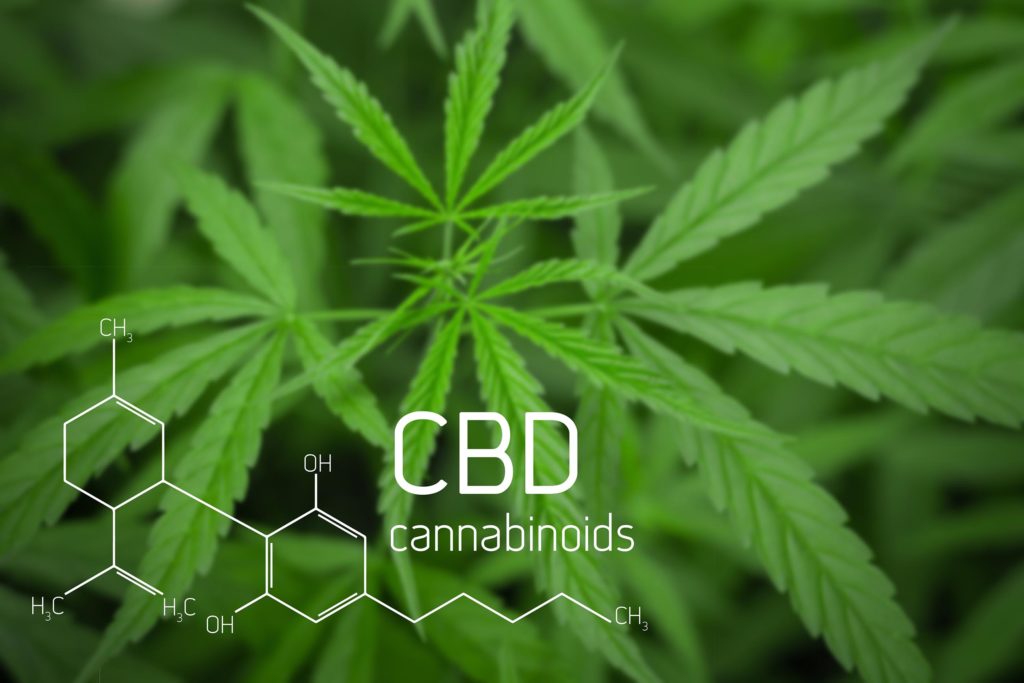
From a cosmetology standpoint, CBD is used for its potential anti-oxidant and anti-inflammatory qualities, albeit there is very little availability of relevant products due to the currently limited legality of cannabis. Research shows that the protective capacity of cannabidiol is actually more powerful than vitamin E or vitamin C. The US government apparently even recognizes the antioxidant properties of cannabis, considering they have a patent related to it.
Nevertheless, in select places within the ever-growing world of legal cannabis, the purchase of CBD-rich ointments and creams is possible, but these products generally aim to improve skin quality in general. They often consist in a blend of CBD together with many other components ranging from various oils to petrochemicals, which in some cases can provide less satisfying results, and possibly counterproductive ones.
It’s also pertinent to point out the high price tag often associated with these products, even when there may be only miniscule amounts of CBD in them. These high prices can make daily use, intense use or medicinal use somewhat unrealistic for most people.
Hempseed oil creams
On the other hand, countless cosmetic and healing products based on hempseed oil have been manufactured, and specifically cater for skincare. These creams, balms, and other products designed to be applied topically are often mixed with plethora of other ingredients, some of which have the purpose of increasing shelf life.
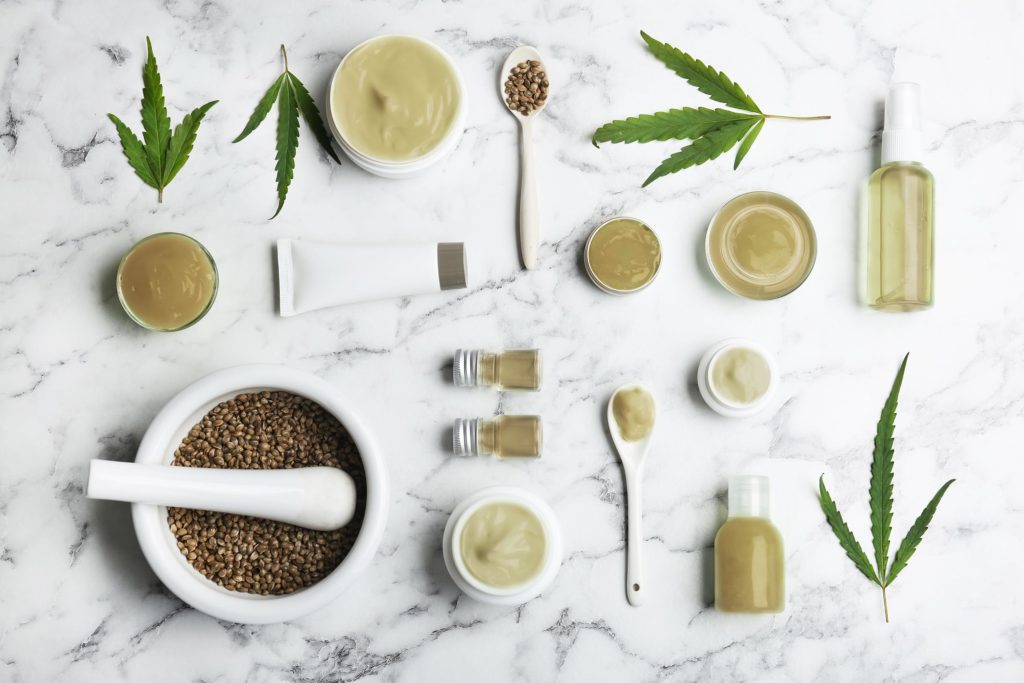
Such cosmetic products, while ineffective in the context of severe skin conditions, or in occurrences of acute acne, may bring significant improvement to sufferers of less severe acne. Research shows that hempseed extract may help with inflammation related to acne, and dietary supplements of hempseed oil have also been shown to help treat symptoms of dermatitis.
The anti-inflammatory property hemp shares with cannabis certainly constitutes a good incentive as to why hempseed oil-based cosmetics can be added safely to the beauty regimen of anyone dealing with acne outbreaks.
Moreover, due to its light consistency, it can be a good base for acne-friendly, homemade moisturizing cream, providing intense nourishment due to its fatty acids content and profusion of nutrients. Last but not least, hempseed oil is to a certain extent available as a culinary product, making these tailored, homemade solutions an attainable reality.
Medicinal CBD products
There have been a handful of recent studies solely focused on the impact of pure CBD on human sebocytes. One especially, published in 2014, gained a lot of attention. For the study, cannabidiol was used on sebaceous glands (which secrete an oily substance called sebum that can lead to oily skin and/or obstructed pores). The study successfully determined that CBD acted as a “highly effective” sebostatic agent.
Acne is characterised by the outbreak of pimples, as well as blackheads, whiteheads, and overall greasy skin. It generally appears on the face, larger neck area, and back. These symptoms, whether of genetic, hormonal, or infectious origins, are mainly caused by an excessive secretion of sebum. This is why the aforementioned study focused on the very glands responsible for this secretion.
According to the study, CBD administrated directly to cultured human sebocytes has resulted in the inhibition of lipogenic actions in several compounds. Lipogenesis is strongly linked to the processing of glucose (sugar) and lipids (fatty acids), notably into the adipose tissues.
The administrated cannabinoid, via the activation of a transient receptor called TRPV4, successfully interfered with a prolipogenic pathway, which in turn, influenced the downregulation in nuclear receptor interacting protein-1 (NRIP1). Said receptor, which influences glucose and lipid metabolism, successfully achieved the inhibition of lipogenesis in sebocytes.
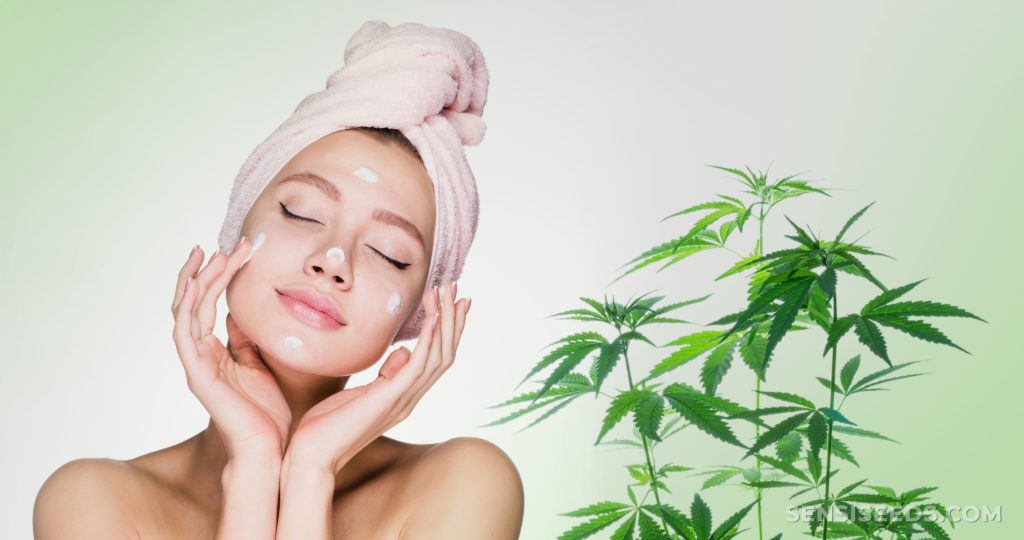
Of course, the well-known anti-inflammatory properties of CBD may be beneficial to the inflammation that often comes with outbreaks.
The study concludes as follows: “Collectively, our findings suggest that, due to the combined lipostatic, anti-proliferative, and anti-inflammatory effects, CBD has potential as a promising therapeutic agent for the treatment of acne vulgaris.”
Practical use of cannabis for acne
The study referred to in the above paragraphs is far from being the only research available. There are other studies that show CBD, as well as less-targeted use of cannabinoids, could be beneficial to acne sufferers (just a couple worth mentioning are this one and this one). However, acne isn’t yet recognized as something officially treatable with cannabis, or CBD.
Places where medicinal cannabis is authorized often function based on a list of ailments approved by governmental entities in charge of public health. Unfortunately, dermatological conditions are often not yet a priority for policy-makers.
However, for patients residing in places in which CBD oil made from industrial hemp (as opposed to made from medicinal cannabis) is freely available for purchase – i.e., some of the places in which industrial hemp is legal – there is a possibility for improvement. Availability generally depends on specifics inherent to each country’s legislation on industrial hemp, import of dietary supplements (if ordering abroad), CBD percentages regulations, etc.
- Disclaimer:This article is not a substitute for professional medical advice, diagnosis, or treatment. Always consult with your doctor or other licensed medical professional. Do not delay seeking medical advice or disregard medical advice due to something you have read on this website.






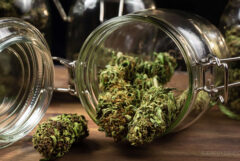
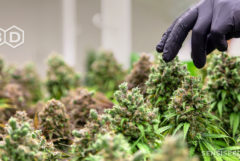


i have been dealing with acne for 15 years and this past spring I started having really bad break outs (5 months before my wedding) and went to the dermatologist again. I received similar products as in the past and nothing was working. My fiancé came across an article that topical CBD was found to help acne. Coincidentally he was working on a CBD topical called CANNIDEX that was neurological focused (not skincare) and the strongest stuff out there. So I gave it a shot and tried it. Within 3 days my forehead cleared up!! I have been using it now for 7 months and have not had a breakout! It’s not marketed for skincare, but it definitely worked for me. I am not an expert, but I recommend it! I couldn’t be happier with my skin now.
Good luck!!
Did you apply topically or take internally?
Shelly-
Can you tell me if this has continued to work for you? Do you apply to the back of the neck or where the acne is? I would love to hear from you , as I have a daughter with severe acne who is overwhelmed by it.
Thank you!
I just started using a cannabis cream on my acne yesterday. I should know in a few days if it is helping or not.
Hi Diane,
Thanks for commenting, good luck and we look forward to hearing about your results 🙂
With best wishes,
Scarlet
Hi Diane,
My name is Ydel. I came across this article by accident, and I saw your comment. I’m just curious if the cream has worked for you?
Thank you.
Ydel Jiang
Hi Diane,
Where did you by the cannabis cream for your face?
Thanks!
Jane
Hi Diane,
Where did you buy the cannabis cream for your face?
Thanks!
Jane